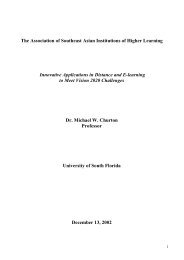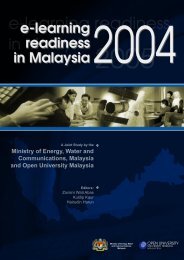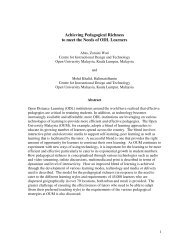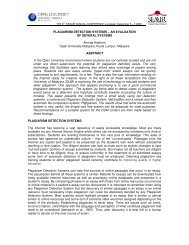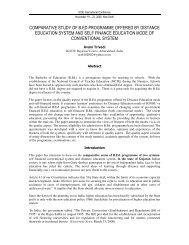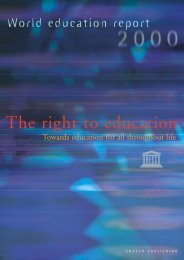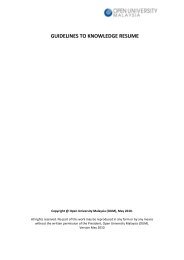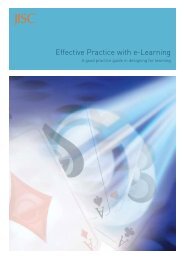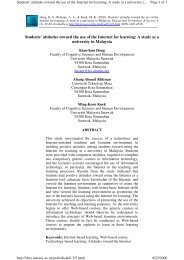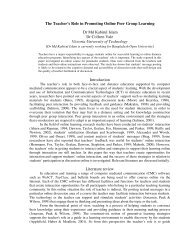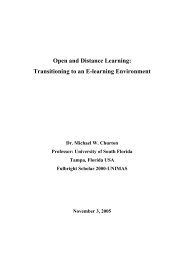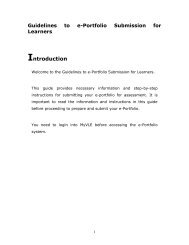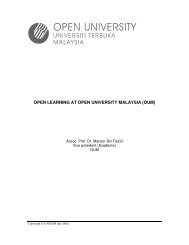lifelong learning and distance higher education - Asia Pacific Region
lifelong learning and distance higher education - Asia Pacific Region
lifelong learning and distance higher education - Asia Pacific Region
- No tags were found...
You also want an ePaper? Increase the reach of your titles
YUMPU automatically turns print PDFs into web optimized ePapers that Google loves.
The Bologna Declaration was followed by the Prague Communiqué (2001) <strong>and</strong> theBerlin Communiqué (2003). Over the years, the importance of <strong>lifelong</strong> <strong>learning</strong>, qualityassurance <strong>and</strong> the recognition of qualifications awarded in the European Higher EducationArea was more <strong>and</strong> more emphasised. The Bologna process has an important impact onNuffic’s work in the realm of international credential evaluation. Among others it hasstrengthened the link between international credential evaluation <strong>and</strong> quality assurance.Quality assurance is one of the main issues in the Bologna Declaration. At nationallevel, quality assurance <strong>and</strong> accreditation is important to ensure accountability, publicprotection <strong>and</strong> quality improvement. From an international perspective it also fulfilsa major function for cross-border mobility. Quality assurance <strong>and</strong> accreditation is animportant precondition for the recognition of a country’s <strong>higher</strong> <strong>education</strong> qualificationsabroad. The field of international credential evaluation depends on reliable informationabout a country’s quality assurance <strong>and</strong> accreditation mechanisms. The purpose ofinternational credential evaluation is to determine to what extent a foreign qualificationis comparable to the general <strong>education</strong>al level, the general content <strong>and</strong> the function/goalof a similar national qualification in the receiving country. Among others, the qualitystatus of a study programme or <strong>education</strong>al provider is an important evaluation criterionfor international credential evaluators. In this respect, it is not important whether acountry has implemented a system of quality assurance or quality accreditation, twodifferent concepts. If the quality of a qualification has been assured by means of a validquality assurance mechanism or accreditation system, this may provide clear <strong>and</strong> reliableinformation for credential evaluators to base their recognition decision on.In most countries, the traditional <strong>distance</strong> <strong>education</strong> sector (e.g the traditional openuniversities) forms an integrated part of the national <strong>education</strong> system <strong>and</strong> as such benefitfrom the quality assurance <strong>and</strong> accreditation mechanisms. As a consequence the awardeddiplomas <strong>and</strong> degrees are nationally recognised <strong>and</strong> international credential evaluators donot treat these qualifications differently than those from “regular” study programmes.Reliable quality assurance mechanisms <strong>and</strong>/or accreditation systems have become evenmore important due to the fact that national laws <strong>and</strong> regulations <strong>and</strong> internationalagreements on international recognition presuppose their existence. In Europe, theLisbon Recognition Convention <strong>and</strong> the European Directives provide a legal frameworkfor cross-border recognition. These legal instruments base their methodology on theexistence of such national systems of quality assurance or accreditation. For example, theLisbon Recognition Convention is applicable to qualifications awarded by institutionsbelonging to a national <strong>education</strong> system. Quality assurance <strong>and</strong> accreditation, if theyexist in the country involved, are considered to be part of that national <strong>education</strong>system. If ICT-supported <strong>distance</strong> courses are part of tuition leading to nationallyrecognised qualifications, then legal recognition instruments like the convention apply.It is then assumed that these courses fall within the boundaries of the quality assurancemechanisms of the institution involved. However, this approach disregards – indeed, itmust disregard – the question of whether this methodology uses specific quality assurancest<strong>and</strong>ards <strong>and</strong> criteria for ICT-supported <strong>distance</strong> courses.Alternative systems <strong>and</strong> mechanisms of quality assurance might be useful, especiallyin fields where national systems are not available. One example in many countries isthe field of non-degree programmes or ICT-supported transnational <strong>higher</strong> <strong>education</strong>.Transnational or cross-border <strong>education</strong> <strong>and</strong> programmes that are offered via <strong>distance</strong><strong>learning</strong> or virtual <strong>education</strong> may or may not belong to one single national <strong>education</strong>system. It is recommended that the providers of these programmes either try to joinnational quality assurance <strong>and</strong> accreditation systems or take the initiative in setting123



